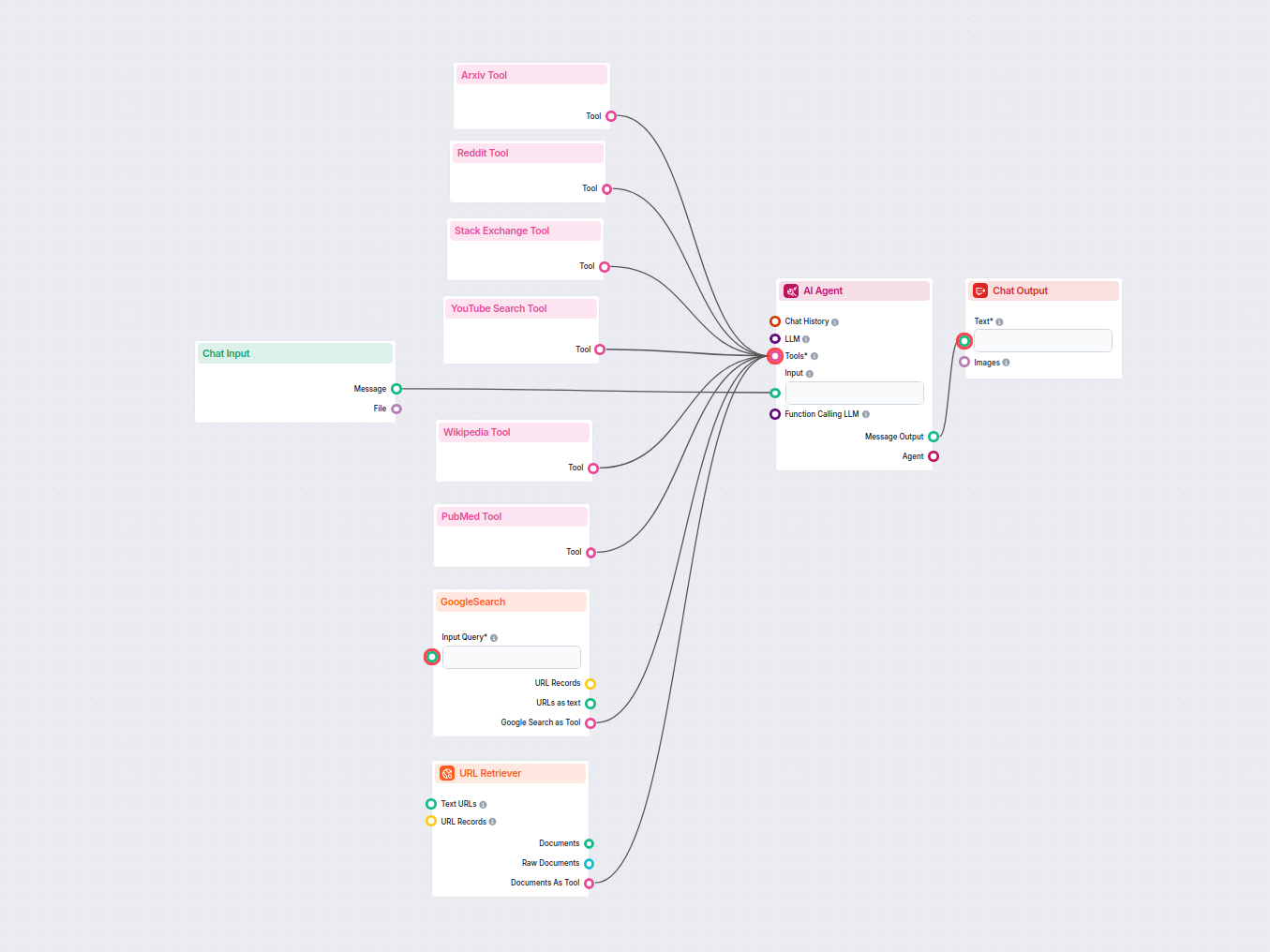
AI Chatbot with Real-Time Web & Knowledge Search
A powerful AI chatbot that answers user questions in real-time by retrieving and synthesizing information from Google, Reddit, Wikipedia, Arxiv, Stack Exchange,...

FlowHunt’s PubMed Tool lets you chat with AI about 37M+ PubMed biomedical citations, offering concise research insights and easy access to scientific literature.
Component description
You can finally trust AI with your research thanks to a direct and up-to-date link to PubMed. With the help of AI Agents, you can effortlessly chat with over 37 million biomedical citations. The Agent searches the PubMed database to match your query and provides you with concise responses.
The PubMed Tool component lets you chat with millions of reputable biomedical articles. This way, you can turn hours of looking for the right sources into a quick chat. Based on your choices, it can either return articles from the PubMed database, along with a short description and a link, or piece together information from various entries.
Remember that PubMed is a database that links to the articles but doesn’t contain their full versions. That’s why FlowHunt can only access publicly available information on PubMed, such as the abstracts and authors.
While the component’s JSON definition includes some configurable fields, most are advanced and intended for internal or agent use:
| Input Name | Type | Description |
|---|---|---|
| tool_description | String | (Advanced) Helps the agent understand the tool’s purpose and usage. |
| tool_name | String | (Advanced) The reference name for the tool when used by an agent. |
| verbose | Boolean | (Advanced) Enables verbose output for debugging or detailed logs. |
These inputs are generally set internally and are not required for basic use. They provide flexibility for advanced users customizing agent behaviors or debugging.
The main output of the PubMed component is:
| Output Name | Type | Description |
|---|---|---|
| tool | Tool | The configured PubMed search tool instance, ready for use by an AI agent. |
This component works with an autonomous AI agent. AI Agents are computer programs that can perform tasks and make decisions independently. The Agents observe their environment and take action based on their unique programming, knowledge, and goals.
If you need more information, simply ask the bot. It’s just like chatting with a knowledgeable friend. It will get deeper into the topic, combining various articles or seamlessly switching to other related topics.
Let’s create a basic PubMed Chabot. Thanks to the use of an AI Agent, the Flow is super simple and contains just a few components:
Steps:
Feel free to experiment and expand the Flow. You can add more search tools and Knowledge Retrievers to make the bot a true information powerhouse. Play around with the Agent’s goal and backstory to achieve your desired output.
Note: If you want the Chatbot to link sources, simply add this requirement to the Agent’s goal.
Let’s say you’re trying to find out what’s new in brain cancer research:
The Chatbot will return a couple of recently trending articles on the topic. You can specify how many you want in the chat or simply ask it to give you more options. To get more information about an entry, simply ask about it or follow the link.
What happens if there isn’t a PubMed entry that matches your query? The Chatbot lets you know about it instead of hallucinating an answer. Let’s test it. Let’s ask the PubMed Chatbot about an SEO SaaS it shouldn’t know anything about.
When the Agent can’t find any suitable PubMed articles, it apologizes and prompts you to search the web for your query instead:
To help you get started quickly, we have prepared several example flow templates that demonstrate how to use the PubMed Tool component effectively. These templates showcase different use cases and best practices, making it easier for you to understand and implement the component in your own projects.
A powerful AI chatbot that answers user questions in real-time by retrieving and synthesizing information from Google, Reddit, Wikipedia, Arxiv, Stack Exchange,...
The PubMed Tool allows you to chat with AI about over 37 million reputable biomedical articles from PubMed, providing concise summaries and direct links to sources.
It uses autonomous AI Agents to search the PubMed database, matching your queries and delivering summarized responses. You can request articles, summaries, or deeper exploration on topics.
No, the tool provides access to publicly available information such as abstracts and author details. Full-text access depends on the availability in PubMed.
Yes, it can be easily added to your FlowHunt flows, enabling streamlined research and chatbot interactions within your custom AI workflows.
The AI Agent will inform you that there are no matching articles, avoiding hallucinated responses, and may prompt you to search the web for more information.
Effortlessly access, summarize, and explore biomedical research with AI-powered chat. Experience streamlined knowledge retrieval with FlowHunt.
Learn how to create a medical chatbot with AI using FlowHunt's PubMed tool. This comprehensive guide covers setting up a research flow, integrating AI agents, a...
Effortlessly chat with any Wikipedia page using FlowHunt's AI Agents. Get concise summaries, source links, and turn hours of research into interactive insights.
Effortlessly chat with any Reddit thread using FlowHunt's AI Agents. Instantly summarize discussions, get source links, and explore topics without hours of manu...
Cookie Consent
We use cookies to enhance your browsing experience and analyze our traffic. See our privacy policy.






